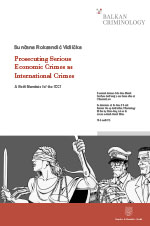Criminal Responsibility for Severe Economic Crimes Committed in Transitional Periods
As pointed out in RF I “the fall of communism in the Balkans, ethnic conflict in the former Yugoslavia, the new allocation of state-wealth and its accumulation by the ‘new elite’ usually strongly connected to or part of the criminal underworld, as well as weak states and corrupt justice systems, are just some of the conditions encountered in the region […]. This seems to be fertile ground for organised criminal groups to operate in and for illegal markets […] as informal economies to grow”.
Unfortunately, so far, serious economic crimes and violations of economic, social and cultural rights have often been neglected in criminal proceedings and/or reports of truth commissions that have followed economic transitions or conflicts. Although these economic crimes often resulted in a substantial loss of profit in the overall economy and in society, they have not been widely and effectively prosecuted. The Central-East and Balkan region is no exception to this rule. However, as argued in the Ph.D. thesis, from Nuremberg on, there have been attempts and successful examples in prosecuting war profiteering cases. Even quite recently, ICC’s prosecutor called for such a prosecution to be conducted before the ICC. The dissertation focuses on the concepts of criminal responsibility for severe economic offences committed in the transitional period, as well as of establishing serious economic criminal offence as crime under international law. It explores legal and social preconditions under which serious economic offences in general may be characterized as crimes under international criminal law. It searches for answers to why those crimes were left out of the focus of mainstream international c
In order to find justification for introducing new(transitional) economic offences in the ICC Statute (ICCSt), Art. 21 of ICCSt is used as the guiding discourse. The underlying “Rechtsgut” analysed in this Ph.D. study is the protection of economic and social rights (understood both as collective and individual rights). The study therefore places emphasis on the indivisibility of human rights and explores whether prosecuting serious economic crimes should be seen as a necessary step in order to correspond with new global developments and with the concept of human security, as it is understood today.Therefore, the study explores the possibilities for connecting international criminal law with discourses of international human rights law, security studies, (supranational) criminology, political sciences, transitional justice, (economic) criminal law and international criminal justice in order to find arguments for why it is necessary to start prosecuting serious (transitional) economic offences as crimes under international law and why the Rechtsgut is in need of protection by the prosecution of those crimes on an international level, sheltered by the “security, peace and well-being of the world.” Accordingly, possible approaches of how to address these crimes at the international criminal level are put forward and explored, through amendments to the International Criminal Court’s (ICC) ratione materiae jurisdiction or prosecuting severe (serious and widespread) transitional economic offences as crimes against humanity as “other inhumane acts.”
Finally, it is argued that Art. 7(1)(k) of the ICCSt is the most plausible solution for prosecuting serious economic crimes and articulates which economic crimes are those that should be prosecuted as other inhumane acts.

MPPG contact for Criminal Responsibility for Severe Economic Crimes Committed in Transitional Periods: Dr. Sunčana Roksandić Vidlička
